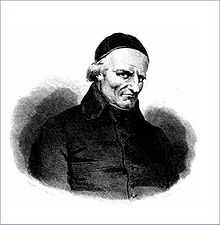Louis-Pierre Anquetil

Louis-Pierre Anquetil (February 21, 1723 – September 6, 1808) was a French historian.
Biography
He was born in Paris. In 1741 he joined the religious community of the Génofévains, where he took holy orders and became professor of theology and literature. Later, he became rector of the seminary at Reims, where he wrote his Histoire civile et politique de Reims (5 vols., 1756–1757), perhaps his best work. He was then director of the college of Senlis, where he composed his Esprit de la Ligue, ou histoire politique des troubles de France pendant les XVIe et XVIIe siècles (1767). He also became a member of the Académie des Inscriptions et Belles-Lettres.[1]
During the Reign of Terror he was imprisoned at St-Lazare; there he began his Précis de l'histoire universelle, afterwards published in three volumes. On the establishment of the Institut de France he was elected a member of the Académie des sciences morales et politiques, and was soon afterwards employed in the office of the ministry of foreign affairs, profiting by his experience to write his Motifs des guerres et des traités de paix sous Louis XIV, Louis XV, Louis XVI.
He is said to have been asked by Napoleon to write his Histoire de France (14 vols., 1805), a mediocre compilation at second or third hand, with the assistance of de Mézeray or Paul François Velly (1709–1759). This work, nevertheless, went through numerous editions, and made Anquetil famous. It was continued by Bouillet in 6 more volumes.
His younger brother, Abraham Hyacinthe Anquetil-Duperron was a famous orientalist.
Notes
- ↑ Penny cyclopaedia of the Society for the Diffusion of Useful Knowledge, 1833, page 56
References
-
 This article incorporates text from a publication now in the public domain: Chisholm, Hugh, ed. (1911). "Anquetil, Louis Pierre". Encyclopædia Britannica (11th ed.). Cambridge University Press
This article incorporates text from a publication now in the public domain: Chisholm, Hugh, ed. (1911). "Anquetil, Louis Pierre". Encyclopædia Britannica (11th ed.). Cambridge University Press
Further reading
-
 A'Becket, John J. (1913). "Louis-Pierre Anquetil". Catholic Encyclopedia.
A'Becket, John J. (1913). "Louis-Pierre Anquetil". Catholic Encyclopedia. -
 "Anquetil, Louis Pierre". New International Encyclopedia. 1905.
"Anquetil, Louis Pierre". New International Encyclopedia. 1905.
|